Everyone loves a great turkey dinner on Thanksgiving, so make sure you give them the best tasting turkey possible! Oven baked turkey is great, but it doesnt hold a candle to a perfectly smoked turkey.
Smoking a juicy flavorful turkey is a coveted skill of backyard pitmasters. When smoking a turkey, a common question arises – should I spritz my smoked turkey or not? Spritzing involves periodically spraying your turkey with liquid during the smoking process. This technique promises added moisture and flavor. However some argue it disrupts cooking and hinders crispiness. So what’s the verdict? Let’s break down the spritzing debate.
What is Spritzing?
-
Spritzing means spraying or misting your meat with a liquid while it smokes using a spray bottle or mop.
-
It helps prevent the turkey from drying out by creating a moist cooking environment.
-
Spritzing is done every 30-60 minutes throughout the smoking time
-
The spritzing liquid often contains fruit juices, broths, vinegar, wine or water.
Potential Benefits of Spritzing Turkey
There are several touted benefits to spritzing your smoked turkey:
-
Adds Moisture – Spritzing introduces extra moisture to keep the turkey juicy and tender.
-
Infuses Flavor – Spritzing liquids like apple juice, wine or broths impart flavor into the meat.
-
Promotes Bark Formation – Spritzing can help develop a flavorful, crispy bark on the skin’s surface.
-
Aids Smoke Penetration – Applying moisture enables smoke to better penetrate the meat.
-
Lowers Surface Temp – Spritzing cools the meat surface slightly to prevent burning.
-
Makes Leftovers Juicier – Spritzing turkey can help leftovers stay moister after reheating.
Reasons to Avoid Spritzing Turkey
However, there are also some potential drawbacks of spritzing to consider:
-
Washes Away Rub & Smoke – Frequent spritzing can rinse away dry rub and smoke compounds before they fully penetrate.
-
Lengthens Cook Time – Opening the smoker to spritz repeatedly allows heat to escape, prolonging cook time.
-
Makes Skin Less Crispy – Added moisture from spritzing can inhibit the turkey skin from crisping up.
-
Causes Temperature Swings – Spritzing cools the meat surface, which then has to reheat, creating temperature fluctuations.
-
Dilutes Flavor – For purists, spritzing can water down the natural turkey flavor.
Best Practices for Spritzing Smoked Turkey
If you do choose to spritz your turkey, follow these tips:
-
Wait until after the first hour of smoking before the first spritz. This allows the rub and smoke to set.
-
Use a flavorful liquid like apple juice versus plain water so the spritz imparts taste.
-
Spritz the underside and back more than the skin you want crispy.
-
Spritz lightly to mist versus drenching the surface.
-
Avoid sugary liquids that can burn quickly on the hot meat.
-
Spritz every 45-60 minutes to limit heat loss by opening the smoker less often.
-
Once the turkey reaches 165°F, stop spritzing to allow the skin to crisp.
Should You Spritz Your Smoked Turkey?
So should you spritz or not? Here are some final tips:
-
If your priority is a super crispy skin, avoid spritzing.
-
For a moister, more tender turkey, spritzing is recommended.
-
Split the difference – spritz early, then stop late in the smoke to crisp the skin.
-
Injecting or brining the turkey instead can also add moisture and flavor.
-
There’s no right or wrong approach. Choose what suits your preferences.
-
Experiment to see if spritzing aligns with your goals for the ideal smoked turkey.
While spritzing turkey during smoking remains a debated topic, the choice is ultimately up to you and your desired outcome. With proper technique, spritzing can positively impact taste, moisture and texture. Consider the pros and cons, then decide if spritzing fits your turkey smoking style.

DON’T stuff the turkey
Since this turkey is cooked / smoked at a low temperature, the cavity needs to be empty to allow that hot air to circulate through the bird. If its stuffed with dressing/stuffing, this will make the bird cook slower.
We dont want it cooking any slower than we need to at this low temperature because it could prevent the turkey from rising above the danger zone of 40-140°F in the first 3 hours or so.
When poultry is in this temperature zone, it allows bacteria to grow and multiply possibly causing food borne illness.
Now that we have the turkey brined, dried, and seasoned; its time to fire up those smokers and get to the fun part. Smoking the turkey!
If you have tried my smoked whole chicken recipe, you will see the similarities in the cooking methods. Low and slow for some smoke, then hot and fast for a nice crispy skin.
Charcoal Grill / Gas Grill
I dont recommend using a charcoal grill when smoking a turkey. You can line the inside perimeter of the grill with charcoal briskets in a snake form and light only one side.
This would allow the charcoal to burn slowly and keep a lower temperature. Its pretty inconsistent with temperature unless you have a lot of experience with it. Start testing this method on a chicken, and definitely NOT for Thanksgiving dinner.
Gas grills can be used, just be prepared to have a lot of propane on hand. You will get a nice flavor on the turkey, but not as good as a wood smoker.
- Whole Turkey – Grab a 10-14lb turkey from your local grocery store. They will come frozen most of the time and around Thansksgiving, you can find REALLY good deals.
- Brine – Brining a chicken in fresh water, kosher salt, apple juice, & dark brown sugar helps keep the turkey moist during cooking and will churn out a nice tender bird.
- Seasoning – Succulent flavors and great ingredients make this turkey really stand out. Salted butter, fresh cracked black pepper, minced garlic, rosemary, thyme, & sage is all you need.
- Wood chips – Using fruit woods such as cherry wood or apple wood chips give this smoked turkey a great flavor. They dont overpower the seasonings yet still impart a nice mild smoke on the bird.
- Perfect side dishes – Mashed potatoes, stuffing/dressing, green beans, rolls, and a nice pumpkin pie really go well with this turkey.
Before we can start cooking this bad boy, a little prep and seasoning is required. So lets get this bird ready to go on the smoker.
Before starting the smoker or seasoning the turkey, we need to remove the giblets from inside of the turkey. These are normally placed in a bag inside the cavity of the turkey.
This bag(s) will include the heart, liver, kidneys, gizzard, and neck of the bird. The neck will be outside of the bag, but inside the turkey cavity.
Brining the turkey before seasoning and smoking is optional. This will help keep the chickens moist while cooking, but is not required. To brine the turkey, grab a bucket big enough to submerge the turkey fully in water, such as a 5 gallon bucket commonly found at Lowes or Home Depot.
In a pot combine these smoked turkey brine ingredients and heat to boiling.
- 3 gallons fresh water
- 3 cups kosher salt
- 4 cups apple juice
- 2 cups dark brown sugar
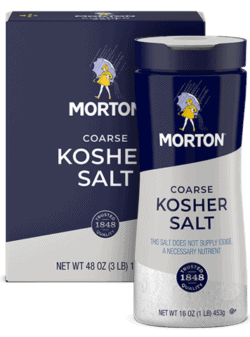
After bringing to a low boil, stir pot until all ingredients are dissolved into the water. Remove from heat and allow to cool. Ice cubes can be added to speed up the cooling process.
Add turkey (gizzards removed) to the 5 gallon bucket and pour the cooled brine water over the turkey until fully submerged. Place bucket in your refrigerator and brine for at least 4 hours, if not overnight
Remove the turkey from the brine and rinse with fresh cold water. Discard the brine, do NOT save the brine to use in the future. Always use fresh brine when brining turkey or chickens.
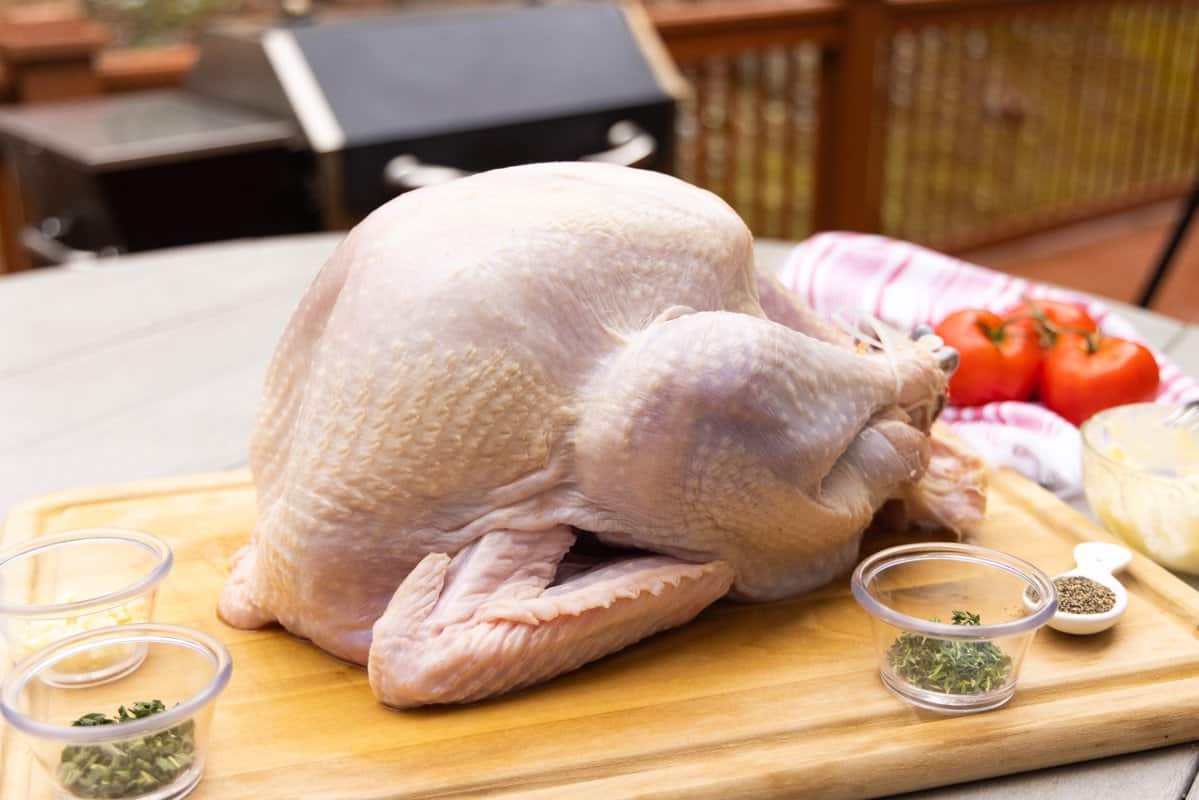
Pat the whole chickens dry with paper towels making sure to get around the legs and under any skin. Tie the legs together with butcher twine or leave the plastic leg holder on the turkey. This helps the bird cook evenly and prevents the breast meat from drying out faster than the legs and thighs.
Were using fresh herbs and salted butter for this smoked turkey recipe.
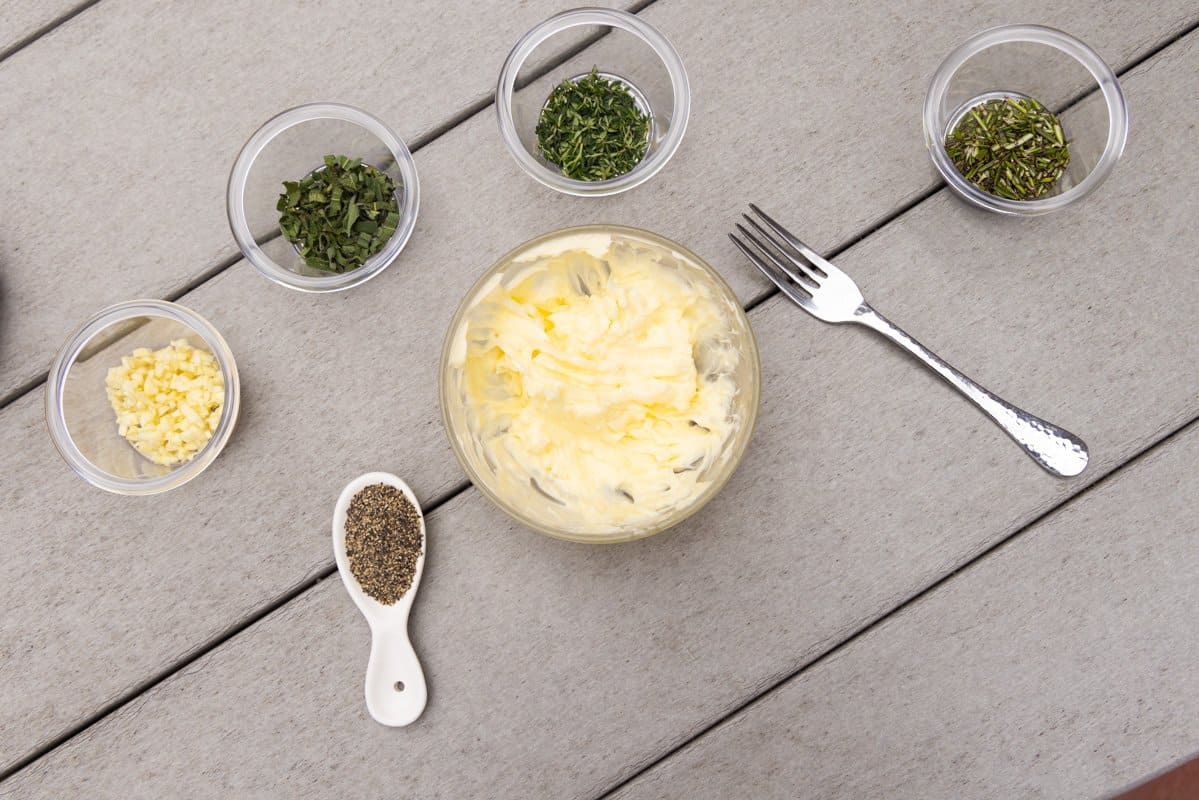
Soften the butter in the microwave or leave on the counter for several hours. Get the ingredients ready to add to the butter.
- Salted butter
- Black pepper (freshly cracked)
- Garlic (minced, not garlic powder)
- Rosemary
- Thyme
- Sage
When butter is soft, mix in the remaining seasonings and mix well.
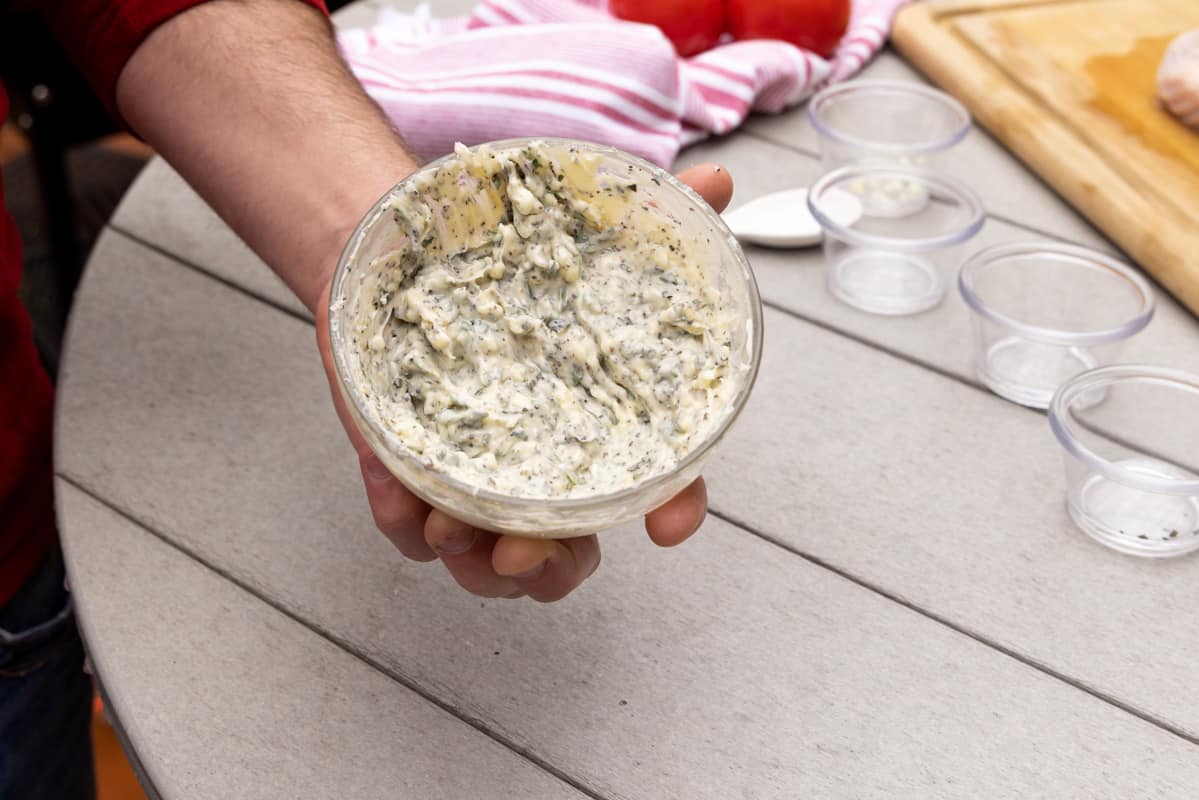
Next, its time to rub the turkey all over with the seasoned butter. Make sure the turkey is patted dry before rubbing the butter all over the turkey.
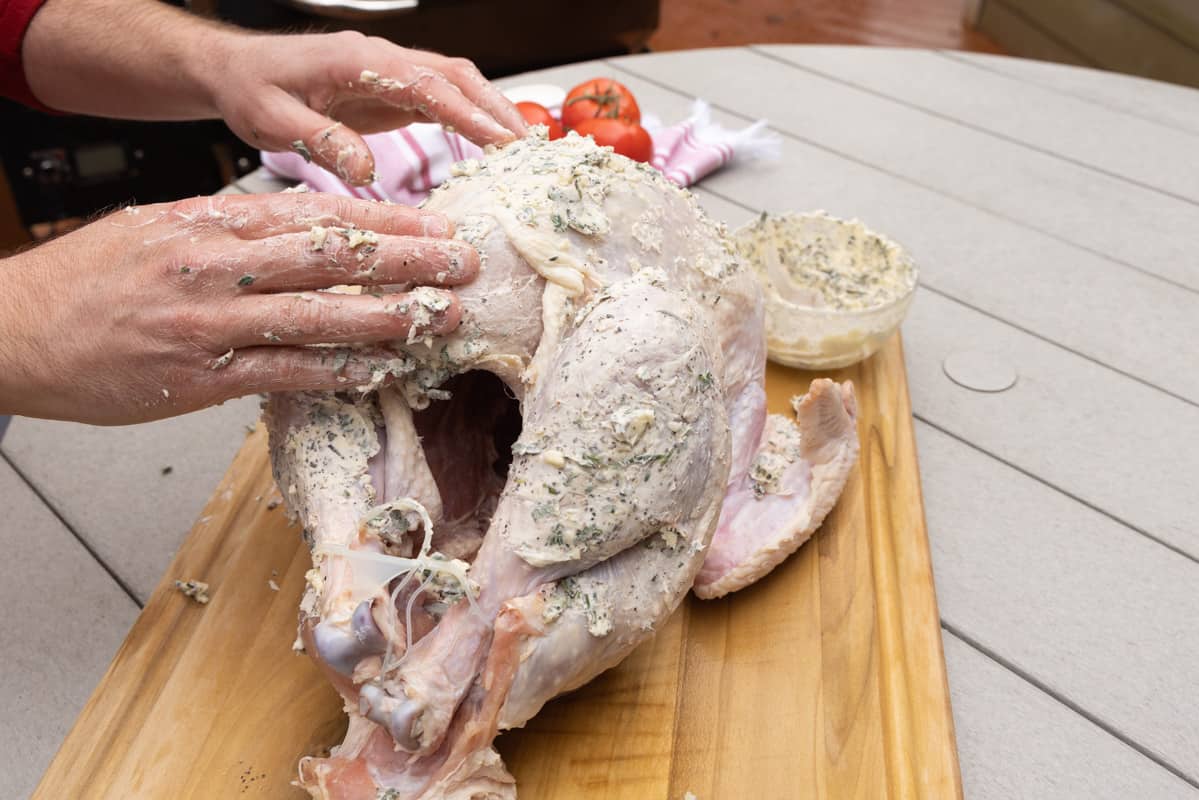
Also make sure to rub the butter underneath the skin and onto the breast meat. This will help give the meat as well as the skin this amazing flavor.
Should I spritz turkey while smoking?
FAQ
What to baste a turkey with when smoking?
What is the best thing to spray a turkey with?
How do you get crispy skin on a smoked turkey?
Should you spritz meat when smoking?
